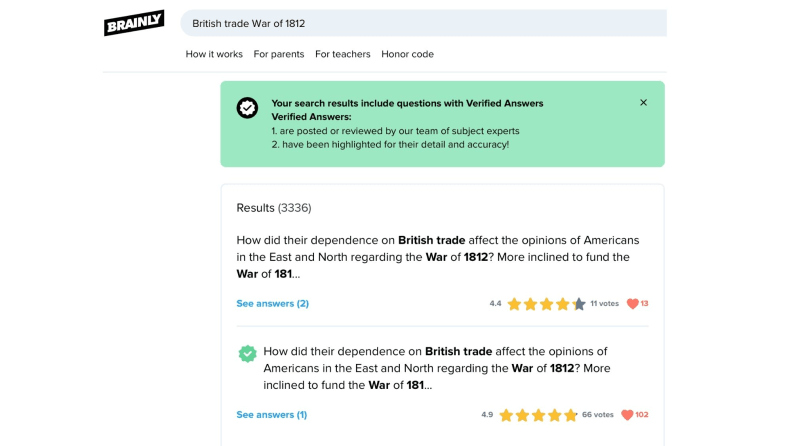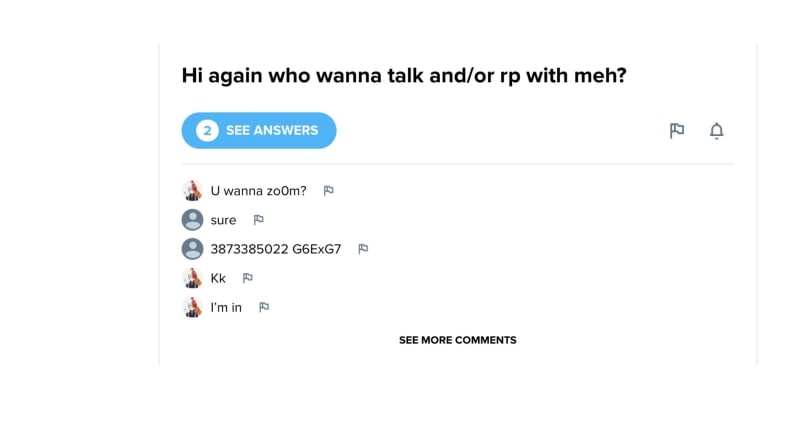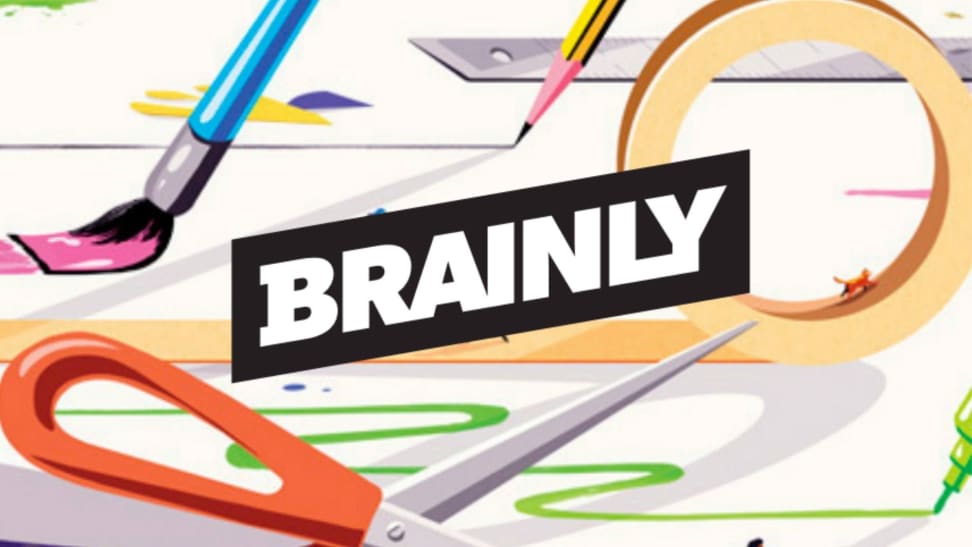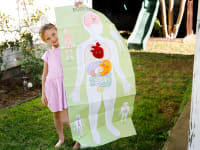Products are chosen independently by our editors. Purchases made through our links may earn us a commission.
When was the last time you contemplated a Pythagorean theorem—or any other high school math concept, for that matter? We’re the first to admit that when it comes to helping our kids with homework, time has dulled our ability to recall arcane concepts—particularly in math and science—and has basically rendered us useless as homework helpers.
Add the challenges of remote learning and students are facing more pressure to figure out answers and concepts on their own, without the help of study groups or as much face-time with teachers.
Enter: the peer-to-peer learning platform, Brainly. While there are dozens of pay-based tutoring platforms, like Chegg and Preply, Brainly differs in that it is largely free (there is a free option and a $24 annual ad-free option) and rather than connecting students with teachers and tutors, it connects them with other learners as they hash out answers in a message board format.
While Brainly has been around since 2009 it—not surprisingly—experienced a 75% surge of growth in 2020. It now has over 350 million users and recently got an $80 million infusion of funding to help the company grow even more.
The concept of an online-peer-to-peer learning platform piqued our interest, so we—along with a couple of teachers—dove in to see just how useful Brainly is and if it’s your child’s answer to remote-learning woes.
What is Brainly?
Brainly is, essentially, a crowd-sourcing platform where users can post questions regarding their homework and get answers from anonymous users. Geared towards middle, high school, and college students, it’s a peer-to-peer crowdsourcing information site that functions similarly to Quora: A homework or test question is posed and other members can offer answers. Simple as that.
The site offers help in a wide breadth of subjects including math, physics, advanced placement, SAT help, foreign languages, medicine, and law. Brainly is moderated by a team of volunteers that are peer users as well as teachers, and it operates on an honor code that prohibits plagiarism and stipulates that users only post content from textbooks or course materials with explicit permission from teachers.
What we thought of Brainly
We spent a week using Brainly and solicited input from a high school history teacher and Advanced Placement facilitator, a college physics professor, and a high school freshman. Here is what we thought.
Usability
Grade: A-

Posting questions is easy as posting on Facebook or Twitter.
Overall, it’s pretty easy to get started on Brainly. It’s a rapid sign-up process and, if you’re looking for answers for something specific, the search function is simple to use and gives instant gratification. We also like that you can quickly scan for verified answers, which have been vetted by Brainly expert volunteers and are determined to be correct and accurate. In terms of posting questions, it’s as easy as posting on Twitter and Facebook; you can add files for easy uploads from worksheets.
The quality of the verified answers were pretty good, however if your question doesn’t have a verified answer, there is a lot of garbage to wade through, and that’s where the site gets confusing to new users and lost points with all of the testers overall.
As a parent scanning for whether or not it's a site I'd want my child on, initial use of the site had some confusing aspects. The site is riddled with random questions that have nothing to do with school or learning, there are more incorrect answers than correct ones to wade through, and it’s initially difficult to get your bearings as a parent figuring out just how useful the site is without an actual aim or specific question at hand. If you're just coming to roam around without a clear intent, the site can look like a wasteland of random posts. However, for students who arrive with a purpose and an actual question, it's very user friendly and easy to rapidly find what you need—you just have to exercise due diligence and be ready to determine the accuracy of the answers you find.
A major bonus to this site is it's a 24/7 repository of information. If your child waited until the last minute to do their homework, no worries! There's still homework help to be found and an answer may appear for them within literal minutes. The question is, will that answer be correct and error-free? That's up for debate.
Accuracy
Grade: C

Verified answers yield the best results. Other answers are hit-or-miss.
This is where things get problematic. While the verified answers are generally correct ones, there is a whole lot of misinformation to wade through with error-laden responses, or answers that have no bearings on the original question. Since users gain points and add to their positive profile ranking for every question answered, incorrect or irrelevant answers are ostensibly posted to help the user increase their ranking on the site. This is something that Brainly works to remedy with a force of volunteer moderators, but those answers can still be up for a while before they are addressed.
Christopher Duston, a physics professor at Merrimack College in North Andover, MA, says that he looked at a variety of college-level math and physics questions and found many of the answers to be incorrect. He questions the usefulness of the site and found the number of nonsensical answers and non-subject-related interactions to be frustrating. What he did mention as a positive, however, is that you can upvote answers that are actually useful and the ease of reporting erroneous content was simple. We tested the reporting system as well and we were pleased with how effortless it was.
Luca D., a 15-year-old high school freshman in Massachusetts, says that, as a rule, he doesn’t post questions to Brainly, for fear of getting the wrong answers. He has used the site for a while now but says he only uses it to search for basic information, and then he cross-references the answers he finds to verify accuracy.
“I wouldn’t say that the quality of the answers is all that great. You have to go in with an amount of critical thinking and you have to have some knowledge of a subject, otherwise you can find some pretty bad answers,” he says, adding that, for most people he knows, Brainly is a place for copy and pasting. He says “it’s not a place that inspires critical thinking,” but he does find it useful as a jumping off point.
Educational benefits
Grade: C-

Sometimes questions are less than academic.
A quick run through and we found users talking about dating preferences, asking to meet new people on Zoom, and posting discount codes for sunglass purchases. For better or for worse, students are using this as a new social networking opportunity—and that’s important for parents to know. While you may think your kids are spending time crowdsourcing for answers to their French homework, they may actually be connecting with faceless strangers online.
We asked Jakub Piwnik, communications director at Brainly, how the site plans to address issues like this. He says that the company relies greatly on a diverse group of Brainly volunteers to help vet information and ensure that it’s a safe environment for users. He says non-education-based activity makes up “a fractional percentage of platform engagement” and that most questions not related to study are promptly removed from the platform
“Brainly volunteers are a… diverse group, comprised mostly of students, but also include current and former educators as well—all united by a passion for education. They support our community… and [help] moderate content when it falls outside our guidelines. Our volunteers embody the spirit of learning and helpfulness that drives our community," says Piwnik.
Is it worth it?
Overall grade: C+ Brainly has a noble goal to be a helpful resource for a diverse group of learners and it's filling a much-needed niche, however we wouldn't say it's an online gathering of intellectualism quite yet. It's a useful site and, as it grows, we are hopeful it will work out the kinks, but—as it currently functions—I'd be wary of my child using it as a dependable place for answers or educational growth.
Annmarie Stackhouse, a high school history teacher and an Advanced Placement facilitator in Gloucester, MA, says that, in terms of using the site for what it’s actually meant for, she’s wary of “honor code”, which cautions against plagiarism—both in posts and with users taking information from the site.
“If people are giving answers it is my experience as a veteran teacher that most will copy and paste that answer without changing it,” she says. “I may sign up as a teacher just to see if my kids are cheating.”



